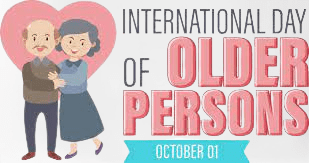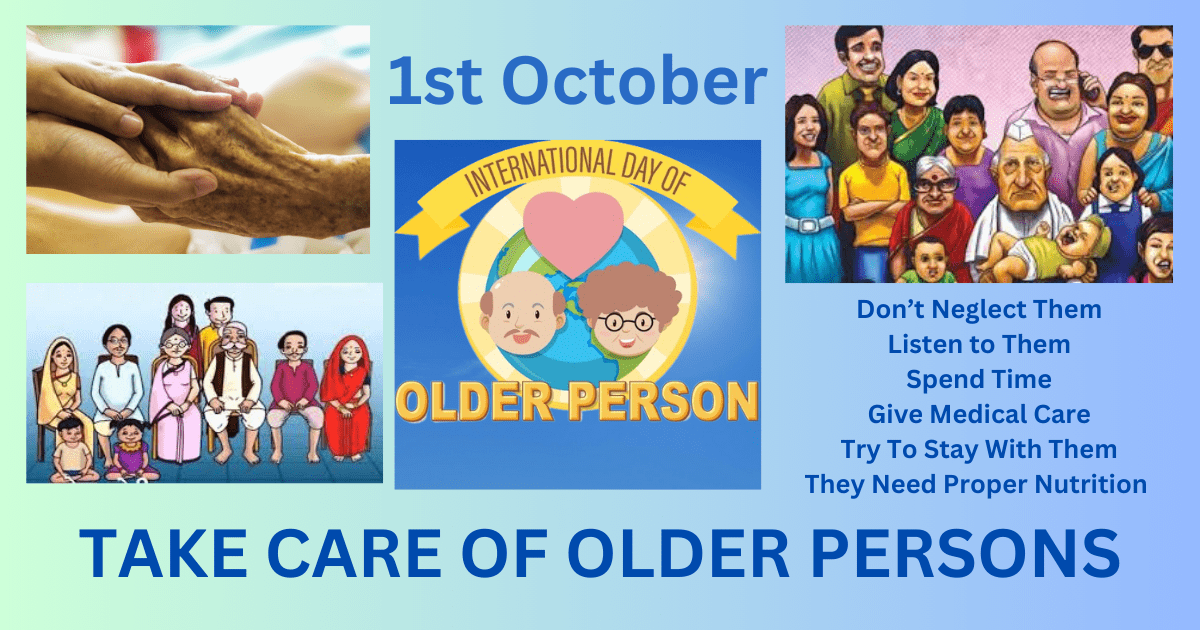International Day of Older Persons: International Day of Older Persons is a special day for the senior citizens all over the world. On December 14, 1990, the UN General Assembly made October 1 as the International Day of Older Persons. The International Day of Older Persons was observed for the first time on October 1, 1991. The day is celebrated annually to recognize the contributions of older persons and to examine issues that affect their lives. This day provides an opportunity to acknowledge the contribution, wisdom, dignity and needs of our senior citizens and to rededicate
our efforts to ensure their well-being.
International Day of Older Persons
International Day of Older Persons is celebrated annually on 1st October to recognize the contributions of older persons and to examine issues that affect their lives. International Day of Older Persons provides an opportunity to acknowledge the contribution, wisdom, dignity and needs of our senior citizens and to rededicate our efforts to ensure their well-being.

The number of older people (defined as those aged 65 years or older) tripled from around 260 million in 1980 to 761 million in 2021. Between 2021 and 2050, the global share of the older population is projected to increase from less than 10% to around 17%.
Rapid growth in the number of people reaching older ages underscores the significance of promoting health, preventing, and treating illnesses throughout the entire course of life.
In societies with aging populations, it becomes imperative to adjust to the increasing number of elderly individuals who possess a diverse range of functional capacities. The capability to carry out essential functions and partake in everyday activities is influenced not solely by an individual’s inherent capacity but also by the social and physical environments in which they reside. Supportive environments play a pivotal role in assisting older individuals to maintain their activity levels and independence as they progress in age.

Globally, there were 703 million persons aged 65 or over in 2019. The region of Eastern and South-Eastern Asia was home to the largest number of older persons (261 million), followed by Europe and Northern America (over 200 million).
Over the next three decades, the number of older persons worldwide is projected to more than double, reaching more than 1.5 billion persons in 2050. All regions will see an increase in the size of the older population between 2019 and 2050. The largest increase (312 million) is projected to occur in Eastern and South-Eastern Asia, growing from 261 million in 2019 to 573 million in 2050. The fastest increase in the number of older persons is expected in Northern Africa and Western Asia, rising from 29 million in 2019 to 96 million in 2050 (an increase of 226 per cent).
The second fastest increase is projected for sub-Saharan Africa, where the population aged 65 or over could grow from 32 million in 2019 to 101 million in 2050 (218 per cent). By contrast, the increase is expected to be relatively small in Australia and New Zealand (84 per cent) and in Europe and Northern America (48 per cent), regions where the population is already significantly older than in other parts of the world.
Among development groups, less developed countries excluding the least developed countries will be home to more than two-thirds of the world’s older population (1.1 billion) in 2050. Yet the fastest increase is projected to take place in the least developed countries, where the number of persons aged 65 or over could rise from 37 million in 2019 to 120 million in 2050 (225 per cent).
International Day of Older Persons Theme 2023
- 1998 & 2000: Towards A Society for All Ages.
- 2004: Older Persons in an Intergenerational Society.
- 2005: Ageing in the New Millennium.
- 2006: Improving the Quality of Life for Older Persons: Advancing UN Global Strategies.
- 2007: Addressing the Challenges and Opportunities of Ageing.
- 2008: Rights of Older Persons.
- 2009: Celebrating the 10th Anniversary of the International Year of Older Persons: Towards a Society for All Ages.
- 2010: Older Persons and the Achievement of the MDGs.
- 2011: The Growing Opportunities & Challenges of Global Ageing.
- 2012: Longevity: Shaping the Future.
- 2013: The Future We Want: What Older Persons are Saying.
- 2014: Leaving No One Behind: Promoting a Society for All.
- 2015: Sustainability and Age Inclusiveness in the Urban Environment.
- 2016: Take a Stand Against Ageism.
- 2017: Stepping into the Future: Tapping the Talents, Contributions and Participation of Older Persons in Society.
- 2018: Celebrating Older Human Rights Champions.
- 2019: The Journey to Age Equality.
- 2020: Pandemics: Do They Change How We Address Age and Ageing?
- 2021: Digital Equity for All Ages.
- 2022: Resilience of Older Persons in a Changing World.
- 2023: Fulfilling the Promises of the Universal Declaration of Human Rights for Older Persons: Across Generations
Did you know?
- The number of people aged 65 years or older worldwide is projected to more than double, rising from 761 million in 2021 to 1.6 billion in 2050. The number of people aged 80 years or older is growing even faster.
- Globally, babies born in 2022 are expected to live 71.7 years on average, 25 years longer than those born in 1950.
- Population ageing is an irreversible global trend. In 2021, 1 in 10 people worldwide were aged 65 or above. In 2050, this age group is projected to account for 1 in 6 people globally.
- Women tend to live longer than men and thus comprise the majority of older persons. In 1950, women could expect to live almost four years more than men globally. In 2021, the difference between the two had increased to more than five years.
- The number of individuals categorized as older working-age (55 to 64 years) is projected to surge from 723 million in 2021 to 1,075 million in 2050, and eventually to 1,218 million by 2100
National Award for Senior Citizens in India
Ministry of Social Justice and Empowerment, as the nodal ministry for the cause of senior citizens, has been celebrating the occasion since 2005 by conferring Vayoshreshtha Samman to eminent Senior Citizens and Institutions in recognition for their service towards the elderly persons, especially indigent senior citizens.
Vayoshreshtha Samman
Every year, on the occasion of International Day of Older Persons the Department of Social Justice and Empowerment, Government of India confers the “National Award for Senior Citizens (Vayoshreshtha Samman)” to the eminent and outstanding senior citizens and institutions/organizations involved in rendering distinguished service for the cause of elderly persons, especially indigent senior citizens.

The Vayoshreshtha Samman awards are conferred on 1st October every year by the Hon’ble President of India at Vigyan Bhawan, New Delhi. The “Iconic Mother Award” is conferred to the women senior citizens who in the face of great odds, brought up their children and supported them in being high achievers in the field of their choice. A total of 11 awards are given along with a Certificate, a Memento and also Cash Award. The Vayoshreshtha Samman Awards are given across 13 categories: 07 categories of Institutional type and 06 categories of individual type.
INSTITUTIONAL CATEGORY for Vayoshreshtha Samman
- Best Institution for Research in the field of Ageing
- Best Institution for providing services to Senior Citizens and Awareness Generation
- Best District Panchayat in providing services and facilities to Senior Citizens
- Best Urban Local Body in providing services and facilities to Senior Citizens
- Best State in implementing the Maintenance and Welfare of Parents and Senior Citizens Act, 2007, and providing services and facilities to Senior
- Citizens
- Best Private Sector Organization in promoting the well-being and welfare of Senior Citizens
- Best Public Sector Organization in promoting the well-being and welfare of Senior Citizens
INDIVIDUAL CATEGORY for Vayoshreshtha Samman
- Centenarian
- Iconic Mother
- Lifetime Achievement
- Creative Art
- Sports and Adventure (one each for Male and Female)
- Courage & Bravery (one each for Male and Female)
Benefits of Vayoshreshtha Samman: The Vayoshreshtha Samman Awardee is given a Citation, Memento, and a Cash award of ₹ 2,50,000.

No of awardees in Vayoshreshtha Samman: The total number of Vayoshreshtha Samman Awardees is 15 (Fifteen).
Presentation of Vayoshreshtha Samman Award (Ceremony Details)
- The Award shall be presented in New Delhi at a special ceremony/function to be held on the occasion of the International Day of Older Persons on the 1st of October every year.
- The Awards shall be presented by the President of India or the Prime Minister of India.
- The boarding and lodging expenses of the awardees including one companion for each awardee shall be borne by the Central Government.
- The to-and-fro travelling expenses and accommodation for up to one day prior to and after the date of the Samman ceremony (depending upon the actual arrival and departure dates) shall be arranged and the expenditure shall be reimbursed by the Central Government.
- The TA/ DA admissibility of the Vayoshreshtha Samman awardees and one companion shall be equivalent to that of the Joint Secretary to the Government of India.
Eligibility for nominations for Vayoshreshtha Samman:
- The applicant should be a woman.
- The applicant should be of the age of sixty years or above.
- The applicant should have brought up their children in the face of great odds and supported them In being high achievers.
- The applicant should have demonstrated unwavering devotion and inculcation of good values and ethics In children In highly testing circumstances.
- The children should have made remarkable achievements in society because of the dedication, vision and hard work of the applicant.
- The applicant should have fought for the protection, promotion and empowerment of a girl child.
- The contribution of the applicant applicant should have commanded wide recognition from society.
In addition to this, an inter-generational walkathon is organized at India Gate lawns, New Delhi in the morning of 1st October, which is flag off by the Hon’ble Minister for Social Justice and Empowerment. Hundreds of senior citizens and children from schools and colleges participate in the occasion. State Governments/UT Administrations are requested to observe this occasion in a
befitting manner right up to the Block levels. This Ministry organizes similar Walkathons in 20 other State Capitals ie., Bhubaneshwar, Kolkata, Hyderabad, Mumbai, Shimla, Jaipur, Guwahati, Ahmedabad, Dehradun, Chennai, Kochi, Patna, Chandigarh, Ranchi, Agartala, Bhopal, Raipur, Shillong, Bengaluru and Puducherry in collaboration with Help Age India.
How to Take Care of Older Persons/Grand Parents?
Caring for your grandparents means being loving and giving toward them. Find ways to be helpful, such as helping them at home. Treat your grandparents with respect and dignity. Spending time with them can help you learn all about their lives and experiences. Be patient and kind toward them, even when they frustrate you or annoy you. Remember, your grandparents are older and may not have as much as energy as you do, so offer to be there and care for them.
1 – Assisting Around the House: Ask how you can help out. If they’re struggling to do something, step in and offer to take over. Even if your grandparents don’t ask, take the initiative to offer up your help. You can even ask your parents if there’s something you can do to help.
2 – Interacting with Your Grandparents: Be polite. Show respect and be polite to your grandparents. Even if they ask the same questions over and over or struggle to hear what you say, show your care in how you interact. If they are talking, listen patiently without interrupting them. This shows that you value and respect them.
3 – Spend time with them. One of the greatest ways to show care is by spending time together. Spend time getting to know them. Watch a favorite television show, take a walk in the park together each week, or get together each week for dinner. Have them teach you a game, then teach them one you know
4 – Inquire about their lives. Ask your grandparents about their memories and stories from their lives. Get to know your family history. Ask about their life, and ask what it was like you have your parent as their child. Consider drawing a family tree and make it with your grandparents.
5 – Ask for advice. Grandparents are some of the best people to go to for advice. They have lived much longer than you have and had lots of experiences, both good and bad, to share with you. If you have something weighing on your mind, bring it to a grandparent to discuss. Not only will it give you a new perspective, it will also make your grandparents feel appreciated and valued.
6 – Be cheerful. Some days may be harder than others, but remember that you are doing something for someone you love. If your grandparent asks for a lot of help, think about what you are willing and able to do, then do it with a positive attitude. Especially if your grandparents feel lonely, make an effort to be sociable and happy around them.
7 – Give gifts. Give them thoughtful gifts that show that you care about them and are thinking of them. A gift can be a thing, like a watch or a cellphone , or an experience, like seeing a movie together or going somewhere beautiful to enjoy nature. Think about what your grandparents might appreciate, then make a kind gesture.
8 – Invite them to events. Grandparents love to feel proud of their grandkids. Invite your grandparents to your sports games, concerts, plays, recitals, birthday parties, graduations, and other events. They will likely enjoy being included and feeling like a part of your life.
9 – Track their health. Check in with your grandparents on how they are doing with their health.
10 – Don’t neglect olders, spend time with them, give proper medical care, help them pro actively, don’t leave them alone, take care of their nutritional requirements, keep a close watch always and finally respect and love them.
Thanks for reading. Read4Knowledge is a blogging platform where you can read more interesting articles related to general awareness, health and entertainment.
